
50. That’s the average number of minutes we spend on Facebook every day.
It sounds crazy at first, but when you consider that Apple reported the average iPhone user unlocks their phone over 80 times a day, maybe it’s not that surprising. We love our mobile devices, and we definitely love Facebook.
So we spend a lot of time on Facebook, but does that matter for Real Estate? Can all those hours spent on Facebook really translate into leads and deals?
I’ve spent countless hours working with investors from all across the country and have assembled five of the most common misconceptions about Facebook marketing for Real Estate Investors.
Here’s what they are and why they’re misguided.
Objection #1: “Facebook Marketing for Real Estate Investors Is Too Expensive.”
Imagine you found a vending machine, and every time you put 100 dollars in that vending machine, it gave you $500 back. How many times would you put in $100? Forever, right? You’d do it forever (or hire someone to do it for you) because you know there is a positive return.
What if the vending machine started charging $300 in return for $500? Would you still keep feeding it money? Probably. If the price kept increasing, at some point, you might stop — at the very latest, you’d stop at $500 because now you are breaking even.
Marketing is your vending machine. The deals produced from marketing are the output, just like the example above.
Do you know, for your business, the maximum you can pay per lead and still remain profitable? If you don’t, figure that out today! Investor Carrot has a fantastic calculator you can use.
“Expensive” is a relative term. You need to know your business in order to set appropriate expectations. If your ideal cost per lead is $200 and it takes 10 leads to close a deal, you might have to spend $2,000+ on marketing to get a deal. Too many people start a campaign and give up too early because they did not know their numbers and fail to clearly define success metrics.
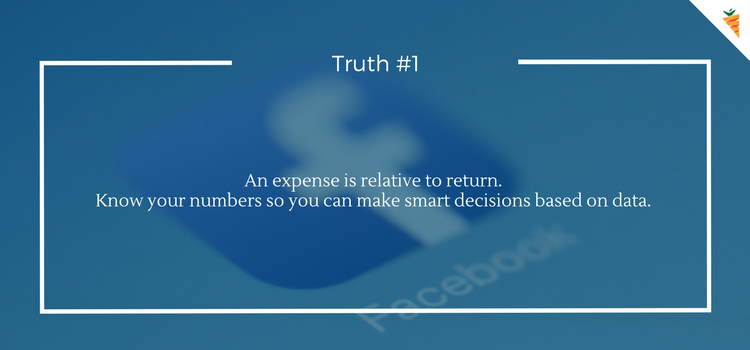
Truth: Expense is relative to return. Know your numbers so you can make smart decisions based on data.
Objection #2: “I Didn’t See Leads Right Away. I Guess It Doesn’t Work.”
In a perfect world, every marketing channel would provide immediate results. That’s the dream, but unfortunately, not the reality.
Most campaigns take a time to build momentum. This is certainly true for Facebook. Several factors contribute to success such as budget, market size, existing traffic on your site (retargeting), market timing, and quality of ad content.
Your first month will be your slowest month. If you have a few extra marketing dollars and want to give Facebook a try, make sure you really assess how committed you are. It’s possible, those few extra dollars are better spent on an existing channel such as PPC or direct mail. I suggest a commitment of at least 90 days – even better is 4 – 6 months – to fully realize the benefits of Facebook.
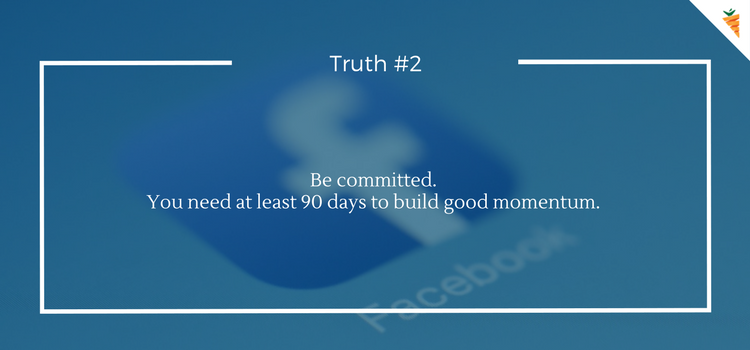
Truth: Be committed. You need at least 90 days to build good momentum.
Objection #3: “I Am Going To Clog My Friends’ Newsfeed With Ads.”
Some people want to clearly differentiate their personal and professional social media lives.
I’ve seen several incredibly successful investors openly sharing on their personal page, but if you fall into the “let’s keep it separate” category, there is good news – with Facebook Business Pages and powerful targeting options, you can run successful ad campaigns while keeping your personal feed clear for cat memes and cute pics of your friends’ kids.
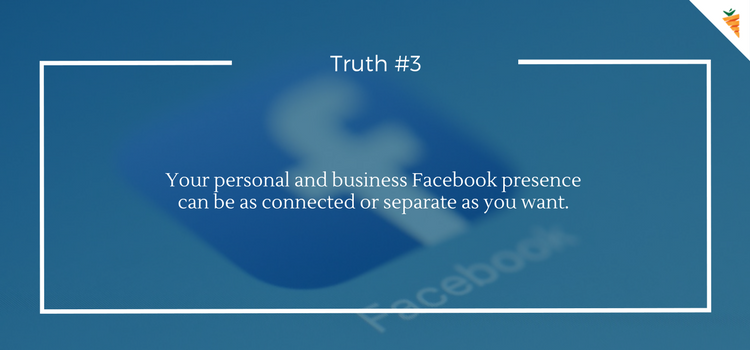
Truth: Your personal and business Facebook presence can be as connected or separate as you want.
Objection #4: “I Need A Bunch Of Likes On My Facebook Page.”
At one point, this was true.
Several years ago, Facebook provided powerful organic (non-paid) reach to the fans of your Business Page. When The Color Run had over 4 million Facebook fans, we could post and get tens, even hundreds of thousands of people engaging on the post. It was thrilling to refresh the page and see the comment count jump exponentially. Then, almost overnight, Facebook announced they were changing their algorithm.
The era of pay to play on Facebook began. The same type of post at The Color Run now created only a couple hundred engagements. We had spent thousands of dollars (and hours) creatively building our fan base, and now we could barely even reach a fraction of our potential. It was a hard pill to swallow, but in the digital world, the only constant is change.
We adapted, and continued to see incredible success from our Facebook campaigns.
Long story short, even if you had a bunch of likes on your page, you would still have to pay to reach them.
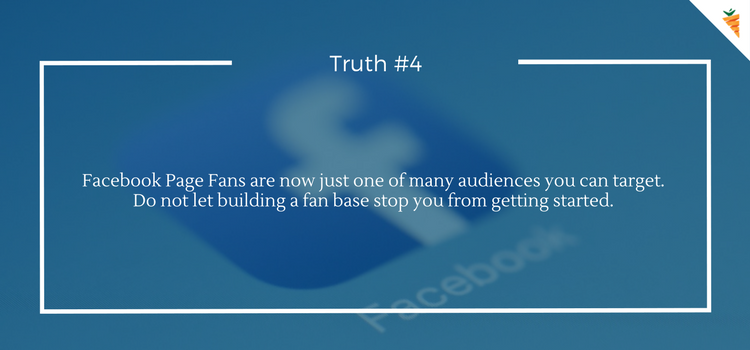
Truth: Facebook Page Fans are now just one of many audiences you can target. Do not let building a fan base stop you from getting started.
Objection #5: “It’s hard to find motivated sellers on Facebook.”
Okay, this one is sometimes true. It can be hard. But here’s the good news — it’s hard for your competitors too, which means they likely aren’t doing it. That equates to untapped opportunity.
Of course, not everyone on Facebook is a motivated seller, but it’s very likely that the motivated sellers in your area are on Facebook.
You might be thinking, “yeah, but my typical deal is with someone in an older demographic.” They’re on Facebook too. In fact, 33% of all Facebook users are over the age of 45, and 17% are older than 55. That’s almost 1 in 5 people over the age of 55. And these people are clicking on ads. In some of my recent client campaigns, on average, 57% of leads came from people 55 and older.
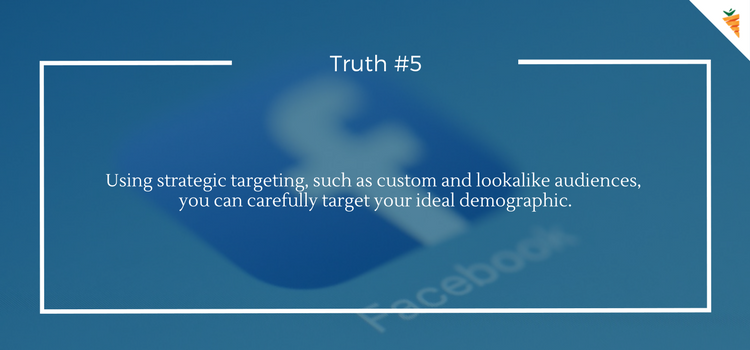
Truth: Using strategic targeting, such as custom and lookalike audiences, you can carefully target your ideal demographic.
The Worst Myth Of All: “Facebook Isn’t Worth My Time.”.
Finding motivated sellers on Facebook is a highly specific targeting challenge to be sure, but it’s that very fact that makes Facebook such an exciting avenue for your REI business.
If it were incredibly simple, everyone would be doing it. Because it takes some finesse, Facebook remains a largely untapped resource to the most dedicated investors.
love this article! I can totally vouch for Kiley! He has been running my campaigns for about 3 months now and I constantly get motivated seller leads. My last 2 deals ( 1 yesterday and 1 a week from yesterday) were from facebook ads. Love it! Kiley is the man!!!
Sweet man! Ya Kiley rocks. Dude, great work on closing those deals. Those are to your Carrot site right?
I’ve actually run some FB ads. The first go around, we were trying to specifically target motivated sellers, and that was a mistake. Actually, Facebook doesn’t like it if you use certain keywords that relate to their exact situation (such as “foreclosure”, or “divorce”). Learned that the hard way. But we find that if we are able to run ads to people looking to sell their house in general, then qualify them on the landing page, then we can sell the regular seller leads to agents while taking the investor leads for ourselves. It works out.